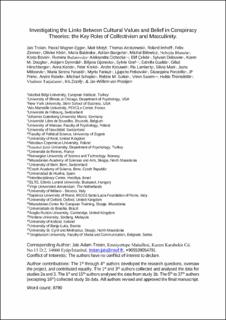Investigating the Links Between Cultural Values and Belief in Conspiracy Theories: the Key Roles of Collectivism and Masculinity
| dc.contributor.author | Troian, Jais | |
| dc.contributor.author | Wagner-Egger, Pascal | |
| dc.contributor.author | Motyl, Matt | |
| dc.contributor.author | Arciszewski, Thomas | |
| dc.contributor.author | Imhoff, Roland | |
| dc.contributor.author | Zimmer, Felix | |
| dc.contributor.author | Klein, Olivier | |
| dc.contributor.author | Babinska, Maria | |
| dc.contributor.author | Bangerter, Adrian | |
| dc.contributor.author | Bilewicz, Michal | |
| dc.contributor.author | Blanuša, Nebojsa | |
| dc.contributor.author | Bovan, Kosta | |
| dc.contributor.author | Bužarovska, Rumena | |
| dc.contributor.author | Cichocka, Aleksandra | |
| dc.contributor.author | Çelebi, Elif | |
| dc.contributor.author | Delouvée, Sylvain | |
| dc.contributor.author | Douglas, Karen M | |
| dc.contributor.author | Dyrendal, Asbjørn | |
| dc.contributor.author | Gjoneska, Biljana | |
| dc.contributor.author | Graf, Sylvie | |
| dc.contributor.author | Gualda, Estrella | |
| dc.contributor.author | Hirschberger, Gilad | |
| dc.contributor.author | Kende, Anna | |
| dc.contributor.author | Krekó, Peter | |
| dc.contributor.author | Krouwel, André | |
| dc.contributor.author | Lamberty, Pia | |
| dc.contributor.author | Mari, Silvia | |
| dc.contributor.author | Milosevic, Jasna | |
| dc.contributor.author | Panasiti, Maria Serena | |
| dc.contributor.author | Pantazi, Myrto | |
| dc.contributor.author | Petkovski, Ljupcho | |
| dc.contributor.author | Porciello, Giuseppina | |
| dc.contributor.author | Prims, J P | |
| dc.contributor.author | Rabelo, André | |
| dc.contributor.author | Schepisi, Michael | |
| dc.contributor.author | Sutton, Robbie M | |
| dc.contributor.author | Swami, Viren | |
| dc.contributor.author | Thorisdottir, Hulda | |
| dc.contributor.author | Turjacanin, Vladimir | |
| dc.contributor.author | Zezelj, Iris | |
| dc.contributor.author | van Prooijen, Jan-Willem | |
| dc.date.accessioned | 2021-03-18T11:47:19Z | |
| dc.date.available | 2021-03-18T11:47:19Z | |
| dc.date.created | 2020-10-07T12:48:39Z | |
| dc.date.issued | 2021 | |
| dc.identifier.issn | 0162-895X | |
| dc.identifier.uri | https://hdl.handle.net/11250/2734178 | |
| dc.description.abstract | Research suggests that belief in conspiracy theories (CT) stems from basic psychological mechanisms and is linked to other belief systems (e.g., religious beliefs). While previous research has extensively examined individual and contextual variables associated with CT beliefs, it has not yet investigated the role of culture. In the current research, we tested, based on a situated cultural cognition perspective, the extent to which culture predicts CT beliefs. Using Hofstede's model of cultural values, three nation‐level analyses of data from 25, 19, and 18 countries using different measures of CT beliefs (Study 1, N = 5323; Study 2a, N = 12,255; Study 2b, N = 30,994) revealed positive associations between masculinity, collectivism, and CT beliefs. A cross‐sectional study among U.S. citizens (Study 3, N = 350), using individual‐level measures of Hofstede's values, replicated these findings. A meta‐analysis of correlations across studies corroborated the presence of positive links between CT beliefs, collectivism, r = .31, 95% CI = [.15; .47], and masculinity, r = .39, 95% CI = [.18; .59]. Our results suggest that in addition to individual differences and contextual variables, cultural factors also play an important role in shaping CT beliefs. | en_US |
| dc.language.iso | eng | en_US |
| dc.publisher | Wiley | en_US |
| dc.title | Investigating the Links Between Cultural Values and Belief in Conspiracy Theories: the Key Roles of Collectivism and Masculinity | en_US |
| dc.type | Journal article | en_US |
| dc.description.version | submittedVersion | en_US |
| dc.source.journal | Political Psychology | en_US |
| dc.identifier.doi | https://doi.org/10.1111/pops.12716 | |
| dc.identifier.cristin | 1837901 | |
| dc.description.localcode | © 2020. This is the authors’ manuscript to the article. | en_US |
| cristin.ispublished | false | |
| cristin.fulltext | preprint | |
| cristin.qualitycode | 1 |
